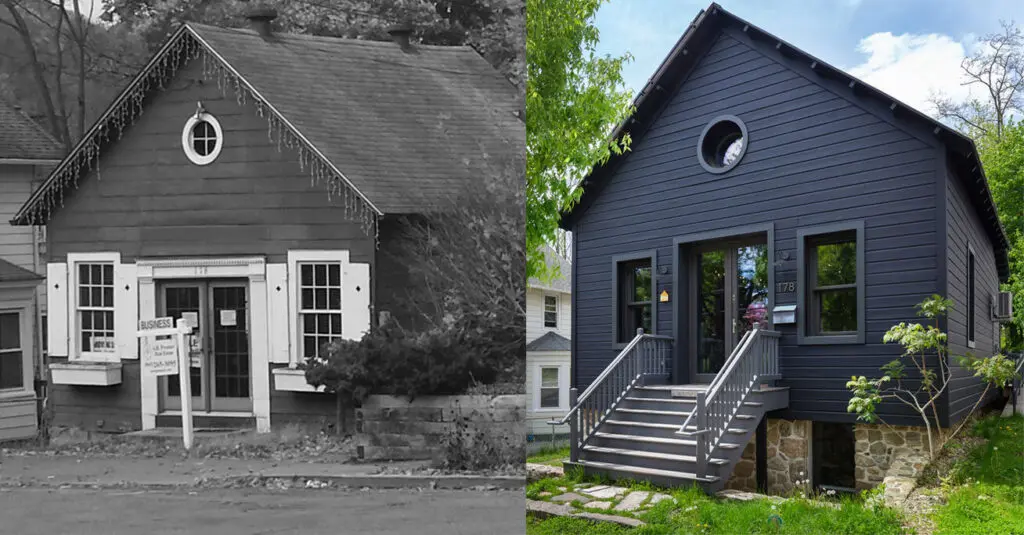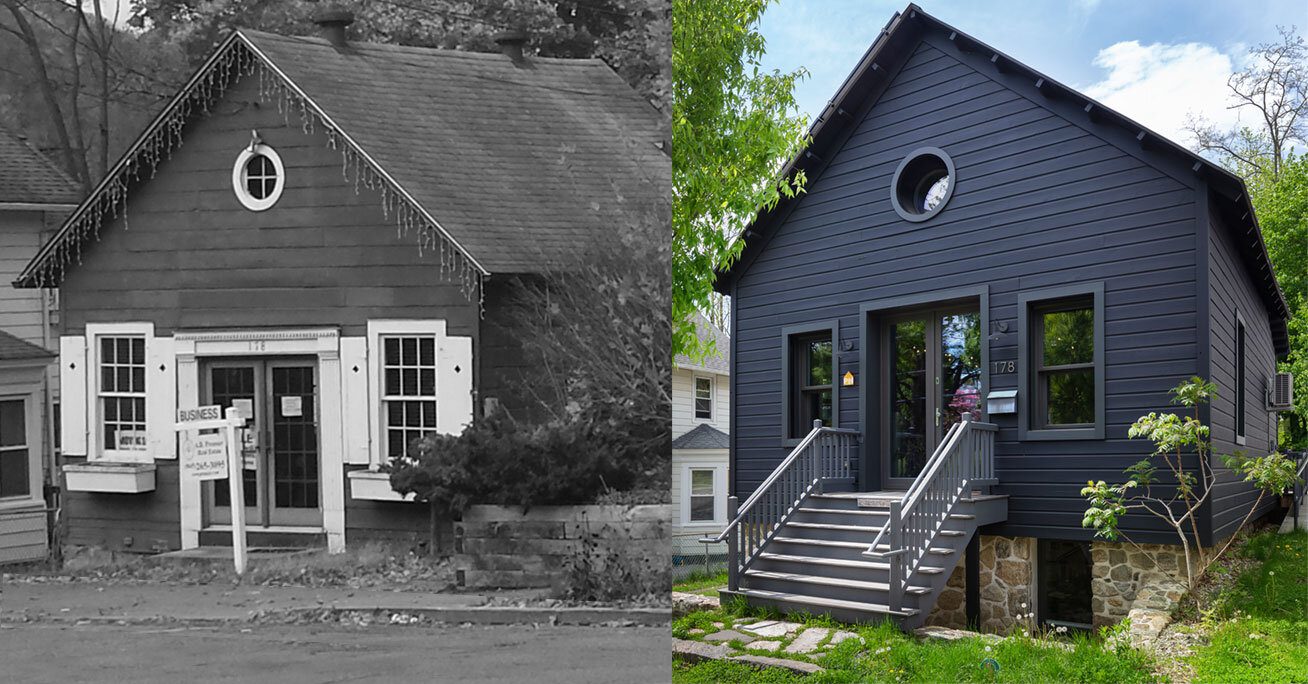
How Reclaimed Foam Panel Insulation From Green Insulation Supports Net Zero Energy Building Goals
Net Zero Energy Buildings (NZEBs) are designed to produce as much energy as they consume, primarily through the integration of renewable energy systems and superior energy efficiency measures. A critical component of achieving NZEBs is proper insulation, which reduces the building’s energy demand for heating and cooling. Reclaimed insulation, especially foam panels like XPS (extruded polystyrene), EPS (expanded polystyrene), and polyiso, offers an eco-friendly and cost-effective solution that supports the energy efficiency needed for NZEBs.

Before and after net zero renovation of 1840’s blacksmith shop to architectural studio courtesy of River Architects PLLC
Understanding the Net Zero Goals of Massachusetts
Massachusetts is at the forefront of the United States’ efforts to combat climate change, with ambitious goals set forth in the Clean Energy and Climate Plan for 2030 and 2050. These goals aim to reduce greenhouse gas emissions by 50% by 2030 and to achieve net zero emissions by 2050. The state’s legislative framework, including the Global Warming Solutions Act and the 2021 Massachusetts Climate Law, mandates strict emission reductions across all sectors, with a particular focus on the energy efficiency of buildings.
The Commonwealth’s plan specifically targets the building sector, which accounts for a significant portion of the state’s emissions. Net Zero Energy Buildings (NZEBs) are a cornerstone of this strategy. NZEBs are buildings designed to produce enough renewable energy to meet their own annual energy consumption, thus achieving net zero energy use. This is accomplished through a combination of improved energy efficiency measures, such as enhanced insulation, and the integration of renewable energy sources like solar panels. Massachusetts aims to transform its building stock to meet these stringent climate goals, promoting the widespread adoption of NZEBs, where reclaimed insulation materials play a vital role.
For more information on Massachusetts’ net zero goals, visit the Massachusetts Clean Energy and Climate Plan and the Massachusetts Clean Energy Center’s Net Zero page.
The Role of Insulation in Achieving Net Zero
Insulation is critical in reducing a building’s energy consumption by minimizing heat loss in winter and heat gain in summer. Effective insulation significantly reduces the need for active heating and cooling, which are the primary energy demands in most buildings.
Reclaimed foam insulation panels are particularly effective due to their high R-values, which measure thermal resistance. XPS, EPS, and polyiso panels, when used for continuous insulation, can greatly enhance the energy performance of a building’s envelope. Continuous insulation, where the insulation is applied in a continuous layer across the entire wall, eliminates thermal bridging—points where heat can escape through the building’s structure.
XPS panels are also widely used for exterior foundation insulation, a critical area for preventing heat loss in buildings. The durability and moisture resistance of XPS make it ideal for below-grade applications, where it protects the foundation and contributes to the overall energy efficiency of the building.
How Reclaimed Insulation Supports Net Zero Goals in Massachusetts
Using reclaimed insulation directly supports Massachusetts’ net zero goals by aligning with the principles of sustainability and resource conservation. Reclaimed insulation panels, sourced from decommissioned buildings or surplus materials, divert waste from landfills and reduce the need for new manufacturing, which is often energy-intensive.
Benefits of using reclaimed insulation include:
- Cost Savings: Reclaimed insulation can be up to 70% less expensive than new materials, making it an economically viable option for large-scale projects.
- Environmental Impact: By reusing materials, reclaimed insulation reduces the carbon footprint associated with producing new insulation products.
- Energy Efficiency: Reclaimed foam insulation maintains high R-values, ensuring that buildings achieve the energy performance needed for NZEB status.
One notable example of reclaimed insulation’s impact is its use in continuous insulation for walls, which ensures that the entire building envelope is insulated without gaps, significantly improving thermal performance. Another application is exterior foundation insulation with XPS panels, which protects the building’s foundation from thermal losses and moisture infiltration, crucial for maintaining the energy efficiency of the building.
While the benefits of reclaimed insulation are clear, there are challenges to consider. Sourcing high-quality reclaimed insulation can be difficult, particularly for projects requiring specific types of insulation. Additionally, installation must be done carefully to ensure that the insulation meets all relevant building codes and performs as expected. However, companies like Green Insulation Group specialize in providing reclaimed insulation solutions, ensuring that these challenges can be effectively managed.
Reclaimed insulation is a powerful tool in the pursuit of net zero energy buildings, particularly in states like Massachusetts, where ambitious climate goals are driving the demand for sustainable building practices. By choosing reclaimed insulation, builders can reduce costs, minimize environmental impact, and contribute to the achievement of Massachusetts’ net zero goals.
To learn more about how reclaimed insulation can help your next project achieve net zero status, visit Green Insulation Group’s resources on reclaimed insulation.
